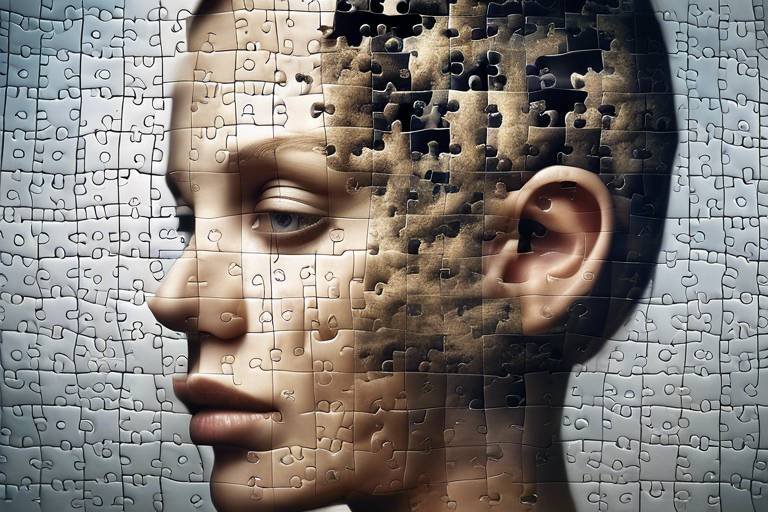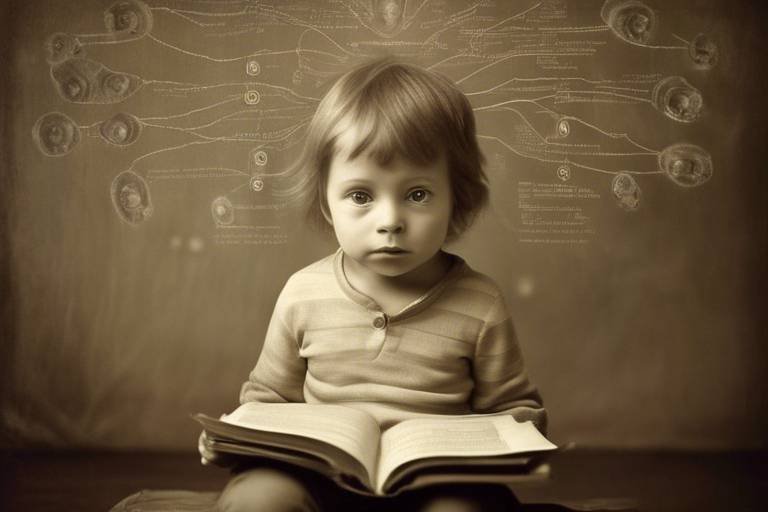What does Quantum Physics Reveal about Consciousness?
Have you ever pondered the profound connection between quantum physics and our very own consciousness? It's a question that tantalizes the minds of scientists, philosophers, and curious individuals alike. At the intersection of science and philosophy, quantum physics offers a unique lens through which we can explore the nature of reality and the essence of the mind. Imagine a world where the fabric of reality is not just a passive backdrop but an active participant in the unfolding of consciousness. This article takes you on a journey through the intriguing relationship between quantum theories and consciousness, shedding light on how these concepts may redefine our understanding of existence itself.
Quantum physics, at its core, challenges our traditional notions of reality. Unlike classical physics, which operates under deterministic laws, quantum mechanics introduces an element of unpredictability and superposition. In this strange realm, particles can exist in multiple states at once until they are observed. This peculiar behavior raises fascinating questions about the role of the observer and the nature of consciousness. Are we merely passive observers, or does our consciousness actively shape the reality we experience? As we delve deeper into the principles of quantum physics, we will uncover insights that may bridge the gap between the physical world and our conscious experience.
The concept of consciousness itself is a profound mystery. What is it that makes us aware of our thoughts, feelings, and surroundings? Various theories attempt to explain consciousness, ranging from the idea that it arises purely from neural processes in the brain to the notion that it is a fundamental aspect of the universe. As we explore these theories, we will encounter philosophical perspectives that challenge our understanding of the mind-body relationship. Dualism posits that the mind and body are distinct entities, while physicalism argues that everything, including consciousness, can be explained through physical processes. On the other hand, panpsychism suggests that consciousness is woven into the very fabric of reality, a perspective that resonates intriguingly with quantum theories.
As we navigate through the complexities of quantum mechanics, we will examine how principles like entanglement and the observer effect might apply to our cognitive processes. The idea that particles can be interconnected regardless of distance raises questions about the interconnectedness of human consciousness. Could it be that our thoughts and intentions are not isolated phenomena but part of a larger, interconnected web of existence? This notion challenges the conventional view of individuality and suggests that consciousness may be more collective than we realize.
In the realm of quantum physics, the act of observation itself appears to influence outcomes. This observer effect has profound implications for our understanding of reality. If consciousness plays a role in shaping the universe, what does that mean for our perception of reality? Are we not just passive recipients of information but active participants in the creation of our experiences? The implications of this idea are both exhilarating and daunting, as it invites us to reconsider our place in the cosmos.
To further unravel this intricate relationship, we will explore key experiments that illustrate the connection between consciousness and quantum phenomena. These experiments not only highlight the bizarre nature of quantum mechanics but also open the door to new ways of thinking about the mind and reality. As we review these findings, we will see how they enhance our understanding of consciousness and its potential role in the universe.
- What is quantum physics? Quantum physics is a branch of physics that deals with the behavior of matter and energy at the smallest scales, such as atoms and subatomic particles.
- How does quantum physics relate to consciousness? Quantum physics raises questions about the nature of reality and the role of the observer, suggesting that consciousness may influence the outcomes of quantum events.
- What are the main theories of consciousness? Theories of consciousness include dualism, physicalism, and panpsychism, each offering different perspectives on the mind-body relationship.
- What is the observer effect? The observer effect refers to the phenomenon where the act of observing a quantum system can change its state, raising questions about the role of consciousness in shaping reality.

The Basics of Quantum Physics
Quantum physics, often termed quantum mechanics, is a fascinating branch of physics that explores the behavior of matter and energy at the smallest scales—think atoms and subatomic particles. Unlike classical physics, which operates under predictable laws of motion and gravity, quantum physics introduces a world that is inherently probabilistic and often counterintuitive. Imagine a realm where particles can exist in multiple states at once, or where two particles can be instantaneously connected regardless of distance. This is the strange yet captivating universe that quantum physics reveals.
At its core, quantum physics challenges our traditional notions of reality. It proposes that particles do not have definite positions or velocities until they are observed. This principle, known as superposition, suggests that a particle can be in multiple states simultaneously until a measurement is made. For example, consider Schrödinger's cat—a thought experiment where a cat in a sealed box can be both alive and dead until someone opens the box and observes it. This paradox highlights the bizarre nature of quantum mechanics, where observation plays a crucial role in determining reality.
Another fundamental concept is entanglement, where pairs or groups of particles become interconnected in such a way that the state of one particle instantly influences the state of another, no matter how far apart they are. This phenomenon has baffled scientists and led to discussions about the implications for communication and information transfer across vast distances. It's as if these particles are whispering secrets to each other, transcending the limitations of space and time.
To further understand quantum physics, let's look at some key principles:
- Wave-Particle Duality: Particles, such as electrons, exhibit properties of both waves and particles. This duality is essential in understanding phenomena like interference patterns.
- Uncertainty Principle: Formulated by Werner Heisenberg, this principle states that certain pairs of physical properties, like position and momentum, cannot both be precisely measured at the same time.
- Quantum Tunneling: This phenomenon allows particles to pass through barriers that, according to classical physics, they shouldn't be able to cross, leading to applications in technologies like semiconductors and quantum computing.
The implications of quantum physics extend beyond the laboratory and into the realms of philosophy and consciousness. As we delve deeper into the mysteries of quantum mechanics, we begin to question the nature of reality itself. Are we merely observers in a universe that is shaped by our perceptions? Or does consciousness play a more active role in the unfolding of reality? These questions not only challenge our understanding of physics but also invite us to explore the intricate relationship between the mind and the universe.
As we navigate through the complexities of quantum physics, it becomes evident that this field is not just about particles and waves; it's about understanding the very fabric of existence. The principles of quantum mechanics may hold the keys to unlocking profound insights into the nature of consciousness, reality, and the interconnectedness of all things. So, buckle up as we venture further into this mind-bending journey where science meets philosophy!

The Nature of Consciousness
Consciousness is one of those elusive concepts that fascinates scientists, philosophers, and everyday people alike. What is it? Where does it come from? Why does it matter? It’s like trying to catch smoke with your bare hands—every time you think you’ve got a grip on it, it slips away. At its core, consciousness is our awareness of ourselves and our surroundings, but defining it further is a challenge. Some argue that it’s merely a byproduct of brain activity, while others suggest it’s something much deeper, perhaps even fundamental to the universe itself.
To peel back the layers of consciousness, we must first acknowledge that it isn’t a one-size-fits-all concept. Various theories attempt to explain its nature, each offering a unique lens through which to view our mental experiences. For instance, cognitive scientists often approach consciousness from a neurological perspective, examining how brain processes give rise to our thoughts and feelings. On the flip side, philosophers ponder whether consciousness exists independently of the physical brain, leading to debates that have persisted for centuries.
One compelling perspective is that of emergentism, which posits that consciousness emerges from complex interactions within the brain's neural networks. Think of it like a symphony: individual instruments (neurons) create beautiful music (consciousness) when they play together harmoniously. In contrast, reductionism suggests that consciousness can be fully understood by breaking it down into its simplest components, much like dissecting a watch to see how each gear contributes to the whole. But does this reductionist approach truly capture the essence of what it means to be conscious?
Moreover, consciousness is not just a passive state; it actively shapes our perception of reality. Our experiences, emotions, and thoughts color how we interpret the world around us. This leads us to the intriguing idea that consciousness may play a role in the very fabric of reality itself. Imagine consciousness as a painter, wielding a brush to create a unique landscape with every stroke. Each thought and feeling adds a splash of color, crafting a reality that is both personal and subjective.
To further understand consciousness, we can explore its relationship with various philosophical frameworks. For example, dualism posits that the mind and body are distinct entities. This perspective raises questions about whether consciousness can exist independently of the physical brain. In contrast, physicalism argues that everything about consciousness can be explained through physical processes, suggesting that our mental experiences are merely the result of biochemical reactions in the brain.
Then there's panpsychism, a fascinating viewpoint that suggests consciousness is a fundamental feature of all matter in the universe. If panpsychism holds any truth, it implies that even the tiniest particles possess some form of consciousness. This notion aligns intriguingly with quantum theories, which posit that at a fundamental level, everything is interconnected. Could it be that our consciousness is not just a product of our brains but part of a universal tapestry of awareness?
As we dive deeper into the nature of consciousness, we begin to see that it’s not just a matter of understanding the brain; it’s about grasping the essence of existence itself. The questions we ask about consciousness can lead us to profound insights about reality, perception, and our place in the cosmos. So, what do you think? Is consciousness merely a byproduct of brain activity, or is it something much more significant? The quest to unravel this mystery continues, bridging the gap between science and philosophy in an attempt to illuminate the depths of human experience.
- What is consciousness? Consciousness is the state of being aware of and able to think about one’s own existence, thoughts, and surroundings.
- How do scientists study consciousness? Scientists study consciousness through various methods, including neuroimaging, behavioral experiments, and philosophical inquiry.
- Is consciousness the same as awareness? While related, consciousness encompasses a broader range of experiences, including self-awareness and the ability to perceive and respond to stimuli.
- Can consciousness exist without a physical body? This is a matter of philosophical debate, with perspectives ranging from dualism (mind and body are separate) to physicalism (consciousness arises from physical processes).

Philosophical Perspectives
The exploration of consciousness through the lens of quantum physics opens up a fascinating dialogue among various philosophical perspectives. Each viewpoint offers a unique lens through which to examine the intricate relationship between mind and matter. For instance, dualism posits that the mind and body are distinct entities. This perspective suggests that consciousness cannot simply be reduced to physical processes. In contrast, physicalism argues that everything, including consciousness, can be explained through physical processes and properties. It’s a bit like trying to solve a complex puzzle; some believe that the pieces are separate, while others assert they’re all part of the same picture.
Then there’s panpsychism, a viewpoint that suggests consciousness is a fundamental quality of all matter. Imagine if every atom had its own tiny spark of awareness; this perspective aligns intriguingly with certain interpretations of quantum theory. It raises the question: could consciousness be woven into the very fabric of the universe? This idea might sound a bit out there, but it invites us to consider consciousness not merely as a byproduct of brain activity but as an intrinsic aspect of existence.
To further illustrate these philosophical perspectives, let’s break them down in a more structured way:
| Philosophical Perspective | Description |
|---|---|
| Dualism | The belief that mind and body are separate entities. |
| Physicalism | The belief that everything, including consciousness, can be explained through physical processes. |
| Panpsychism | The belief that consciousness is a fundamental quality of all matter. |
These philosophical frameworks not only shape our understanding of consciousness but also intersect intriguingly with quantum theories. For instance, the dualistic perspective raises questions about how consciousness could interact with the physical world, especially when considering phenomena like quantum entanglement. On the other hand, physicalism aligns more closely with the scientific approach, suggesting that as we learn more about the brain and quantum mechanics, we might eventually unravel the mysteries of consciousness.
Moreover, the panpsychist view opens up a realm of possibilities, suggesting that consciousness could be a universal thread that connects all forms of existence. This perspective could provide a bridge between the subjective experience of consciousness and the objective nature of physical reality. It’s a bit like finding out that all the threads in a tapestry are interconnected, each contributing to the overall image of existence.
In summary, the philosophical perspectives on consciousness are not merely academic debates; they are essential to understanding how we perceive reality and our place within it. As we delve deeper into quantum physics, these perspectives may evolve, prompting us to reconsider our definitions of consciousness and reality itself. So, the next time you ponder the nature of your own conscious experience, remember that it’s not just a personal journey; it’s a profound exploration that has captivated thinkers for centuries.
- What is dualism? Dualism is the philosophical belief that the mind and body are separate entities.
- How does physicalism view consciousness? Physicalism asserts that everything, including consciousness, can be explained through physical processes.
- What is panpsychism? Panpsychism is the idea that consciousness is a fundamental quality of all matter.

Dualism vs. Physicalism
When we dive into the fascinating debate between dualism and physicalism, we're not just discussing philosophical theories; we're exploring the very essence of what it means to be conscious. Dualism, famously championed by René Descartes, posits that the mind and body are fundamentally different substances. Imagine your mind as a ghostly figure floating above a physical body—two separate entities interacting but not entirely the same. This perspective suggests that consciousness exists independently of the physical realm, opening the door to the idea that our thoughts and feelings could transcend mere biological processes.
On the flip side, we have physicalism, which argues that everything about the mind can be explained through physical processes in the brain. According to this view, consciousness is akin to a software program running on a computer; it’s all about the hardware. This perspective aligns well with the advancements in neuroscience, which have shown how brain activity correlates with thoughts and emotions. If we think of the brain as a complex machine, then consciousness is the output generated by its intricate workings.
But how do these two theories intersect with quantum physics? This is where things get really interesting. Some proponents of dualism suggest that quantum phenomena might provide a bridge between the immaterial mind and the material body. For instance, the concept of superposition—where particles exist in multiple states at once—could imply that our consciousness might also operate in a non-linear fashion, allowing for thoughts and perceptions to exist in a state of potentiality until they are observed or acted upon.
Conversely, physicalists may argue that quantum mechanics does not necessitate a dualistic interpretation of consciousness. They could contend that the brain's physical processes, influenced by quantum effects, are sufficient to explain consciousness without invoking a separate mental substance. This leads us to question whether consciousness can truly be distilled down to physical interactions or if there is something more elusive at play.
To clarify the differences, let’s summarize the key points in the table below:
| Theory | Definition | Connection to Quantum Physics |
|---|---|---|
| Dualism | The mind and body are separate entities. | Quantum phenomena may suggest a non-material aspect of consciousness. |
| Physicalism | Consciousness is entirely a product of physical processes in the brain. | Quantum effects are seen as part of the brain's physical workings. |
Ultimately, the debate between dualism and physicalism is not just a philosophical exercise; it influences how we understand the nature of consciousness itself. As we continue to explore the depths of quantum physics, we may find that the answers to these age-old questions lie at the intersection of science and philosophy, challenging our perceptions of reality and the very fabric of existence.

Panpsychism and Quantum Theory
Panpsychism is a fascinating philosophical perspective that suggests consciousness is not just a byproduct of complex biological systems, but rather a fundamental quality inherent in all matter. Imagine for a moment that everything around us—rocks, trees, even the air we breathe—has some form of consciousness. This idea, while seemingly radical, aligns intriguingly with certain interpretations of quantum theory. The notion that consciousness is a basic feature of the universe opens up an array of possibilities about our existence and the nature of reality itself.
At the heart of this discussion is the relationship between consciousness and the quantum world. Quantum mechanics introduces concepts like superposition and entanglement, which challenge our traditional understanding of how things exist and interact. For instance, in superposition, particles can exist in multiple states at once until observed. This raises the question: could consciousness play a role in collapsing these states into a singular reality? If consciousness is indeed a fundamental aspect of the universe, as panpsychism suggests, then perhaps it is intricately linked to the very fabric of quantum phenomena.
Furthermore, panpsychism posits that even the simplest forms of matter might possess some level of consciousness. This aligns with quantum mechanics' suggestion that everything is interconnected at a fundamental level. Consider the idea of entanglement, where particles become linked and the state of one instantly influences the state of another, regardless of distance. Could this entangled relationship imply a shared consciousness among all things? If every particle has a form of awareness, then the universe itself might be a vast, interconnected web of consciousness.
To further illustrate this connection, let's look at some key ideas that bridge panpsychism and quantum theory:
- Consciousness as Fundamental: Both perspectives suggest that consciousness is not merely an emergent property but a basic element of the universe.
- Interconnectedness: Quantum entanglement mirrors the panpsychist view of a shared consciousness, where all entities are interconnected.
- Observer Effect: The role of the observer in quantum mechanics echoes the panpsychist idea that consciousness influences the physical world.
In conclusion, the synthesis of panpsychism and quantum theory presents a compelling narrative that challenges our conventional understanding of both consciousness and reality. It invites us to reconsider our place in the universe, suggesting that we are not merely passive observers but active participants in a grand, interconnected tapestry of existence. As we delve deeper into the mysteries of quantum mechanics, we may find that the answers to our most profound questions about consciousness lie not just in the mind, but in the very atoms that make up our world.

Quantum Mechanics and the Mind
When we dive into the fascinating realm of quantum mechanics, we uncover principles that seem to defy our everyday understanding of reality. It's almost like stepping into a world where the rules of logic take a backseat, and the bizarre becomes the norm. Now, imagine applying these principles to our minds—yes, our consciousness! It's a thought that can send shivers down your spine, isn't it? The idea that the very fabric of our thoughts and awareness might be intertwined with the quantum world opens up a plethora of questions. Are our cognitive processes influenced by quantum phenomena such as superposition and entanglement?
To grasp this connection, we first need to understand what quantum mechanics entails. In a nutshell, it studies the behavior of particles at the atomic and subatomic levels, where things can exist in multiple states at once (superposition) and be interconnected in ways that seem impossible (entanglement). Now, let's draw an analogy: think of your mind as a vast ocean, and each thought or feeling as a wave. In the quantum realm, these waves can overlap and interact in ways that classical physics simply cannot explain. This suggests that our thoughts might not be as straightforward as we perceive them to be.
Some researchers propose that our brain might function similarly to a quantum computer, processing information in ways that classical computers cannot. This leads us to ponder: could our consciousness be a manifestation of quantum processes? The idea is tantalizing! Imagine if our ability to think, feel, and perceive reality is not just a byproduct of neural connections but also a dance of quantum particles. This perspective invites us to reconsider the very essence of what it means to be conscious.
Moreover, consider the notion of entanglement. In quantum mechanics, entangled particles remain connected regardless of the distance separating them. Could this imply that our thoughts might be interconnected with others, transcending the physical boundaries of our brains? It raises an intriguing possibility: are we, in some way, sharing a collective consciousness that influences our perceptions and experiences? This idea resonates with many spiritual traditions that speak of interconnectedness and unity.
However, it's essential to approach these ideas with a healthy dose of skepticism. While the parallels between quantum mechanics and consciousness are fascinating, they remain largely theoretical. The scientific community is still grappling with the implications of these theories, and we must rely on ongoing research to shed light on this complex relationship. Nevertheless, the intersection of quantum mechanics and the mind offers a rich ground for exploration, inviting us to ask deeper questions about the nature of reality and our place within it.
In summary, the relationship between quantum mechanics and consciousness is a captivating area of study that challenges our conventional understanding of the mind. As we continue to explore this connection, we may uncover insights that not only enhance our understanding of consciousness but also reshape our perception of reality itself. Who knows? The key to unlocking the mysteries of our minds might just lie in the quantum realm.
- What is quantum mechanics? Quantum mechanics is a fundamental theory in physics that describes the physical properties of nature at the scale of atoms and subatomic particles.
- How does quantum mechanics relate to consciousness? Some theories suggest that quantum processes might play a role in cognitive functions, proposing that consciousness could be influenced by quantum phenomena.
- What is superposition? Superposition is a principle of quantum mechanics where a particle can exist in multiple states at once until it is observed.
- What is entanglement? Entanglement is a quantum phenomenon where particles become interconnected, such that the state of one particle instantly influences the state of another, regardless of distance.
- Is there scientific evidence linking quantum mechanics and consciousness? While there are intriguing theories and hypotheses, concrete scientific evidence is still lacking, and the relationship remains largely speculative.

The Observer Effect
The observer effect is one of the most mind-bending concepts in quantum physics, and it raises some fascinating questions about the nature of reality and consciousness. At its core, the observer effect suggests that the act of observation can influence the state of a quantum system. This means that simply by measuring or observing a particle, we can alter its behavior. Isn't that wild? Imagine if our mere attention could change the outcome of events in our lives—like a cosmic game of hide and seek where the act of looking itself changes what we find.
To illustrate this, let’s consider the famous double-slit experiment. When particles, such as electrons, are fired at a barrier with two slits, they behave like waves and create an interference pattern on a screen behind the barrier. However, when we try to observe which slit the particle goes through, the interference pattern disappears, and the particles behave like individual particles instead of waves. This dramatic shift raises a profound question: does consciousness play a role in determining the reality we perceive? Could it be that our awareness itself is a crucial factor in shaping the universe around us?
In a way, the observer effect challenges our traditional views of reality. In classical physics, we might think of the universe as a stage where events unfold independently of us. But in quantum mechanics, it appears that our consciousness and observations are intertwined with the fabric of reality. This leads us to ponder whether consciousness is merely a byproduct of brain activity or if it is something more fundamental—perhaps even a key player in the cosmic drama of existence.
Moreover, the implications of the observer effect stretch beyond the realm of physics. They seep into philosophy, psychology, and even spirituality. If our observations can influence reality, what does that say about our thoughts, beliefs, and intentions? Are we not, in a sense, co-creators of our reality? This perspective invites us to reflect on the power of our minds and the potential impact of our consciousness on the world around us.
To further explore the relationship between the observer effect and consciousness, let’s consider some potential implications:
- Reality is not fixed: The universe may be more fluid than we realize, shaped by our perceptions and interactions.
- The role of intention: Our thoughts and intentions could influence outcomes, suggesting a deeper connection between mind and matter.
- Consciousness as a fundamental aspect: If consciousness affects reality, it could be a core element of the universe, not just a byproduct of physical processes.
As we delve deeper into the mysteries of quantum physics and consciousness, the observer effect serves as a captivating reminder of how interconnected we are with the universe. It challenges us to reconsider our understanding of reality and encourages us to explore the profound potential of our consciousness. Could it be that by simply observing, we are tapping into the very essence of existence?
- What is the observer effect in quantum physics? The observer effect refers to the phenomenon where the act of observing a quantum system alters its state, leading to different outcomes based on whether or not it is observed.
- How does the observer effect relate to consciousness? The observer effect raises questions about the role of consciousness in shaping reality, suggesting that our awareness may influence the physical world.
- Can our thoughts really change reality? While it is still a topic of debate, some interpretations of quantum mechanics imply that our intentions and observations could play a role in determining outcomes.

Implications for Reality
The implications of quantum physics on our understanding of reality are nothing short of mind-boggling. Imagine standing in front of a mirror; what you see is an image that reflects your physical self. However, in the realm of quantum mechanics, the act of observation can fundamentally alter the state of what is being observed. This leads us to ponder: if consciousness plays a role in shaping reality, what does that mean for our day-to-day experiences? Are we merely passive observers, or are we active participants in the creation of our reality?
To grasp this concept, we can look at the famous double-slit experiment, which illustrates how particles behave differently when they are observed. When not observed, particles can exist in a state of superposition, meaning they can be in multiple states at once. However, the moment we observe them, they 'collapse' into a single state. This phenomenon raises profound questions about the nature of reality itself. Is reality merely a construct of our consciousness? Are we, in some way, responsible for the existence of the universe around us?
Furthermore, the observer effect suggests that consciousness is not just a byproduct of brain activity but may play an integral role in the fabric of reality. This challenges the traditional view of a separate, objective universe that exists independently of our perception. Instead, it hints at a more interconnected and dynamic relationship between consciousness and the universe. In this light, reality may not be a fixed entity but rather a fluid tapestry woven from the threads of consciousness and observation.
To illustrate this relationship, consider the following table that summarizes key concepts:
| Concept | Description |
|---|---|
| Superposition | The ability of quantum particles to exist in multiple states simultaneously until observed. |
| Observer Effect | The phenomenon where the act of observation alters the state of a quantum system. |
| Reality as Construct | The idea that reality may be shaped by consciousness rather than being an independent entity. |
In addition to these concepts, the implications of quantum physics extend into various fields such as philosophy, psychology, and even spirituality. For instance, if consciousness can influence reality, it opens the door to new ways of understanding intention, belief, and perception. Imagine the possibilities if we could harness this understanding to improve our lives or even manifest our desires. The power of thought could take on a whole new meaning, shifting from mere abstraction to a tangible force that shapes our existence.
However, with great power comes great responsibility. If our consciousness can influence reality, we must also consider the ethical implications of our thoughts and actions. Are we ready to accept that our perceptions and beliefs can create ripples in the fabric of the universe? This line of inquiry not only challenges our understanding of reality but also invites us to reflect on our role within it.
In conclusion, the implications of quantum physics on reality are profound and complex. They challenge our conventional understanding and invite us to explore deeper questions about the nature of existence, consciousness, and the universe. As we continue to unravel these mysteries, we may find that the boundaries between observer and observed are not as clear-cut as we once believed.
- What is the observer effect in quantum physics? The observer effect refers to changes that the act of observation can make on a quantum system. When particles are observed, they can behave differently than when they are not being observed.
- How does quantum physics relate to consciousness? Quantum physics suggests that consciousness may play a role in shaping reality, challenging the idea of an independent, objective universe.
- What are the philosophical implications of quantum mechanics? The principles of quantum mechanics raise questions about dualism, physicalism, and panpsychism, leading to new perspectives on the mind-body relationship.

Experimental Evidence
The relationship between consciousness and quantum mechanics is not just a theoretical exercise; it has been the subject of numerous experiments that aim to uncover the underlying connections. One of the most famous experiments that highlight this relationship is the double-slit experiment. This experiment demonstrates that particles, such as electrons, can behave both as particles and waves, depending on whether they are being observed. When not observed, these particles create an interference pattern, suggesting they exist in a state of superposition. However, once we observe or measure them, they 'collapse' into a definite state. This phenomenon raises profound questions: Is consciousness itself playing a role in the collapse of the wave function?
Another significant piece of experimental evidence comes from the work of physicist Alfred Einstein, who proposed the concept of entanglement. In entangled systems, the state of one particle is directly related to the state of another, regardless of the distance separating them. This bizarre connection implies that information can be shared instantaneously, which challenges our classical understanding of space and time. Some researchers suggest that this entanglement might be linked to consciousness, suggesting that our minds are somehow interconnected with the fabric of the universe.
Moreover, the Wigner's Friend thought experiment illustrates the complexities of measurement in quantum mechanics and consciousness. In this scenario, Wigner posits that an observer inside a closed laboratory can measure a quantum system, but when Wigner himself observes the outcome, he sees a different reality. This raises questions about the role of an observer in defining reality and whether consciousness is a necessary component in the measurement process.
To further explore this relationship, researchers have conducted various experiments, some of which are summarized in the following table:
| Experiment | Key Findings |
|---|---|
| Double-Slit Experiment | Demonstrates wave-particle duality; observation affects outcomes. |
| Wigner's Friend | Highlights the paradox of observation and reality in quantum mechanics. |
| Entanglement Experiments | Shows instantaneous connections between entangled particles. |
These experiments suggest that consciousness might not just be a byproduct of brain activity but could play a fundamental role in shaping reality itself. While the implications are still being explored, the intersection of quantum physics and consciousness stands as one of the most exciting frontiers in modern science. As researchers continue to delve deeper, they may uncover more about how our minds interact with the quantum realm, potentially reshaping our understanding of both consciousness and reality.
As we ponder these questions, it’s essential to recognize that the exploration of consciousness through the lens of quantum physics is still in its infancy. The more we learn about quantum phenomena, the more we realize how little we truly understand about the nature of consciousness itself. This journey is not just a scientific endeavor but also a philosophical one, encouraging us to rethink what we know about our minds and the universe.
- What is the double-slit experiment? The double-slit experiment demonstrates the wave-particle duality of light and matter, showing that observation affects the behavior of particles.
- How does entanglement relate to consciousness? Entanglement suggests that particles can be interconnected in ways that transcend classical physics, leading some to theorize that consciousness might play a role in this connection.
- What is Wigner's Friend thought experiment? This thought experiment illustrates the complexities of observation in quantum mechanics, questioning the nature of reality and the role of observers.
Frequently Asked Questions
- What is quantum physics?
Quantum physics is a branch of physics that studies the behavior of matter and energy at the smallest scales, such as atoms and subatomic particles. Unlike classical physics, which describes the macroscopic world, quantum physics reveals a reality that's often counterintuitive, where particles can exist in multiple states at once and can be interconnected over vast distances.
- How does quantum physics relate to consciousness?
The relationship between quantum physics and consciousness is a fascinating area of study. Some theories suggest that consciousness may arise from quantum processes in the brain, implying that our awareness and perception of reality might be influenced by quantum phenomena. This intertwining of mind and matter challenges traditional views and opens up new avenues for understanding our existence.
- What is the observer effect in quantum mechanics?
The observer effect refers to changes that the act of observation can make on a quantum system. In simple terms, when we measure or observe a particle, we can influence its state. This concept raises profound questions about the nature of reality and suggests that consciousness might play a role in shaping the universe we experience.
- What are some philosophical perspectives on consciousness?
Philosophical perspectives on consciousness include dualism, which posits that mind and body are separate; physicalism, which argues that everything about the mind can be explained through physical processes; and panpsychism, which suggests that consciousness is a fundamental property of all matter. Each of these views offers different insights into how consciousness might relate to quantum theories.
- Can quantum mechanics explain cognitive processes?
Some researchers propose that principles of quantum mechanics, such as superposition and entanglement, may apply to cognitive processes. This idea suggests that our thought patterns and decision-making could be influenced by quantum states, potentially leading to a deeper understanding of how we think and perceive the world around us.
- What experimental evidence supports the connection between consciousness and quantum phenomena?
Several key experiments, such as those involving quantum entanglement and the double-slit experiment, have been interpreted to suggest a link between consciousness and quantum phenomena. These experiments demonstrate how observation can affect outcomes at the quantum level, hinting at the profound impact consciousness may have on shaping reality.



















